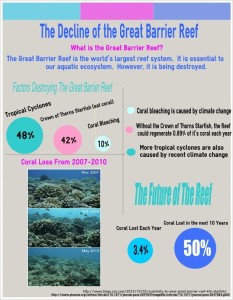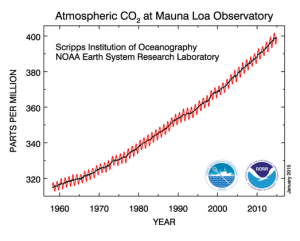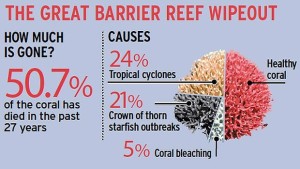OA – Part II

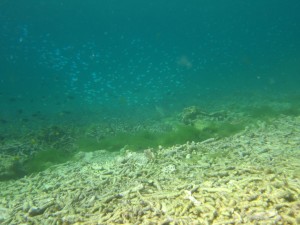
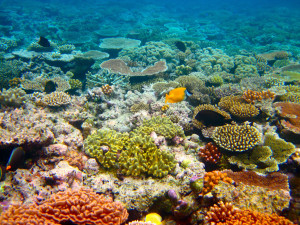
(Part I of Ocean Acidification appeared on 1/7 on this blog.)
Says author Elizabeth Kolbert: “The way corals change the world–with huge construction projects spanning multiple generations–might be likened to the way that humans do, with this crucial difference. Instead of displacing other creatures, corals support them.
“Thousands–perhaps millions–of species have evolved to rely on coral reefs, either directly for protection or food, or indirectly, to prey on those species that come seeking protection or food. This coevolutionary venture has been under way for many geologic epochs. Researches now believe it won’t last out the Anthropocene.” (The term Anthropocene, as reported in Smithsonian, is a fairly new one being used by some experts to describe a new epoch where humans are causing mass extinctions of plant and animal species, polluting the oceans and altering the atmosphere, among other lasting impacts. Some experts think the term is more about pop culture than hard science.)
Between the years 1985 and 2012, report a team of Australian researchers with the Australian Institute of Marine Science, the coral cover in the Great Barrier Reef has been reduced by 50%. “They are under threat around the world from the effects of bleaching, due to rising ocean temperatures, and increasing acidification of the oceans, which reduces the corals’ ability to build their calcium carbonate structures,” according to the report. A major increase in the crown-of-thorns starfish along the Reef as predator of corals is also a significant contributor to the decline.
“‘It is likely that reefs will be the first major ecosystem in the modern era to become ecologically extinct” is how a trio of British scientists recently put it.” (The Sixth Extinction: An Unnatural History, Elizabeth Kolbert, pub. 2014)
Kolbert reports: “…a molecule of CO2 generated by burning fossil fuels will, in the course of its lifetime in the atmosphere, trap a hundred thousand times more heat than was released in producing it.” This effect was originally discovered by Ken Caldiera of Stanford University’s Carnegie Department of Global Ecology. Last November Caldiera and a colleague reported that maximum warming occurs about one decade after a carbon dioxide emission (see report here) .
Noted environmentalist Bill McKibben states in The Global Warming Reader that due to the slow pace of deep ocean circulation and the long life of CO2 in the atmosphere, reversing the current level of ocean acidification is impossible.
